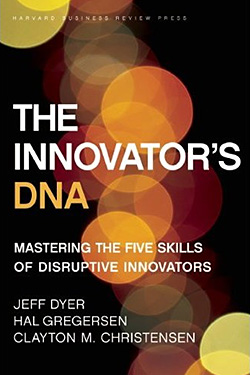 At a McKinsey alumni webcast on creative strategy last week, the presenters mentioned a book due to be soon published by INSEAD professor Hal Gregersen, Jeffrey Dyer of Brigham Young University and Clayton Christensen of Harvard. The authors have spent six years interviewing thousands of innovative businesspeople and concluded there are five key traits innovators share (the Innovator's DNA as they call it).
At a McKinsey alumni webcast on creative strategy last week, the presenters mentioned a book due to be soon published by INSEAD professor Hal Gregersen, Jeffrey Dyer of Brigham Young University and Clayton Christensen of Harvard. The authors have spent six years interviewing thousands of innovative businesspeople and concluded there are five key traits innovators share (the Innovator's DNA as they call it).
Whenever I hear numbers like "six years" and "thousands of interviews," I grow a bit skeptical. That's usually academic code for "If I think about every conversation I can remember..." But their conclusions suggest some interesting New Year's resolutions for those wishing to make 2011 a more innovative year.
1. Associating: innovators "connect the dots"; they associate experiences and facts that others keep separate. The well-worn illustration of this is Steve Jobs connecting a calligraphy class he took in college with computers to make the Mac font more beautiful. In past posts we've talked about how the military strategist John Boyd believes great strategists orient themselves more quickly than competitors by rapidly seeing patterns in seemingly unrelated information. "Mosaic" investors make money by seeing the bigger pattern in seemingly unrelated information.
To be more innovative, then, you need more diverse sources of information and inspiration. Resolve to read magazines you've never considered, watch movies you think you'd hate, and attend lectures of topics apparently unrelated to what you do.
2. Observing: innovators are "intense observers" and so are able to spot customer needs and emerging "weak signals." A good friend of mine is a brilliant marketer. She has been behind the moves and messages of an incredibly diverse cadre of global beauty and consumer product brands. Companies hire her enhanced ability to observe what issues are building buzz and which customers' needs are emerging.
This year put up your antenna. Pretend you are the producer of Jon Stewart's The Daily Show and need to know which issues and topics people care about this week and this month.
3. Experimenting: innovators try things just to see if they work while others want to know if they will work before they try them. A Chinese saying says to "beat the grass to startle the snake." If you don't know if a snake is in a bush but think it might be, beat the grass with a stick. The snake will reveal itself if it's there. Google launches countless "beta" products each year, trying out new offerings to see what will stick. Amazon similarly continually experiments.
So decide that this year you will start taking small risks. Force yourself to conduct, say, five low-risk experiments in your business this year.
4. Questioning: innovators are curious, and they ask questions not just because they are after something but because they enjoy the journey of discovery. When I was in business school preparing for my consulting interviews, a friend suggested that while on the bus on the way to school (I was in New York so driving or walking was not an option), I should take a careful look at each bus stop's advertisements. Between stops I should come up with three ways I could make that poster better. This exercise puts you into an inquisitive mindset. You find yourself continually asking "why?" and "how?" Remember to ask "why?" this year. Read the newspaper, not just to absorb the decisions CEOs and other leaders make, but to challenge them. Ask "Why would Apple embrace Netflix?" and come up with three reasons they should not have (more on that topic in a future post).
5. Networking: finally, innovators are great networkers and they network without a precise goal in mind. They like meeting and talking to new people with opposing views and with seemingly unrelated interests. This gives them access to a breadth of information and resources more diverse than less-innovative people. Method Home, for example, is a consumer products company that has taken a creatively disruptive approach to selling household cleaning supplies. Its success is born form the fact that its founders, who met in school, come from entirely different backgrounds. One is a marketer, the other a chemist. The best private equity firms I work with add considerable value not by building more accurate discounted cash flow models, but by opening up a diverse network, by being able to connect entrepreneurs with a broad range of experts. This year thrust yourself into new networks. Join a club, pick up a hobby, and plan lunches that will put you face-to-face with people who have no obvious networking value for you. You will be surprised by serendipitous opportunities they open up
I'm still thinking about my specific New Year's resolutions. Choosing them is one of my favorite things to do, and provides an exercise to get me motivated for the next year. As you think about what yours may be, consider the five above for an innovative and ultimately more successful 2011.